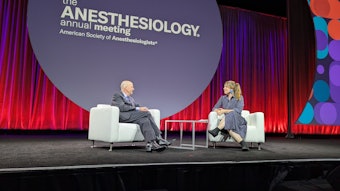Pros and cons of anesthesiology fellowship
Don’t decide until you hear the facts

Should anesthesiology residents continue into a fellowship program? There are solid arguments on both sides of the debate, which played out during the 2022 session “Fellowship-Trained Specialists of Anesthesiology: Is It Worth It?”
Just over half – 56.9% – of all residents moved into fellowship in 2020. That’s more than double the 25.6% in 2017. But completing an anesthesiology fellowship had little impact on employment. Nearly all 2020 anesthesiology fellows (96%) found employment in their specialty, as did 95% of anesthesiology residents who completed training in 2020. So why bother with a fellowship?
“Fellowship helps us to handle increased patient complexity and morbidities,” said Brooke Trainer, MD, FASA, Assistant Professor of Anesthesiology and Critical Care at Virginia Commonwealth University in Richmond. “Fellowship adds value. It distinguishes us from our other care team members. It helps us be a better consultant to our surgical colleagues to increase patient safety. Fellowship opens a vast network of opportunities that residents cannot access.”
It's not quite that simple, countered Srikanth Sridhar, MD, CMQ, FASA, Associate Professor and Vice Chair for Quality of Anesthesiology and Assistant Vice President for Healthcare Quality and Safety, The University of Texas McGovern Medical School in Houston. Fellowship training in anesthesiology is an option, not a must-do.
“There is job market saturation for some specialty care,” Dr. Sridhar explained. “You may end up spending a year on extra training that you don’t use when you finally enter the workforce. That year of income you are giving up to do a fellowship may be detrimental in terms of financial status in early career. And the reality is the vast majority of anesthesiologists practice in a mixed model, not in a subspecialty. All of that specialty information is readily available from experts who have published knowledge at our fingertips to take care of our patients to keep them safe. It doesn’t take a fellowship to be able to provide expert care.”
Too many residents, and too many anesthesiologists, see fellowship in black and white terms, Dr. Trainer said. Graduating residents are either crazy to do a fellowship or crazy not to do a fellowship. The real world is more nuanced.
“When I was going through residency a decade ago, we all felt immense pressure to continue on to fellowship,” she said. “I didn’t have that option because I was military, but I decided after almost 10 years in practice to go back for a fellowship. The reality is that a fellowship can only help you. You may lose a few dollars in the short term, but there is good potential to more than make that up later in your career.”
Dr. Sridhar added there are some good reasons to do a fellowship for those who are not inclined to continue training.
“If you are really passionate about a particular subspecialty and that’s all you want to do, fellowship is the way to go,” he said. “You can go into academia and do that, but most private practices are not amenable to just doing cardiac or just doing pediatrics in the current environment. A second reason is a potential employer may be looking specifically for a cardiac anesthesiologist or a pediatric-trained anesthesiologist; they will put a contract in front of you only if you do this fellowship. If it’s that clear cut, you should do that fellowship.”
Visit Annual Meeting Daily News for more articles.











